Ukraine screams, the world shakes
The Russian invasion launched by a fanatical Vladimir Putin has created a terrifying present in Europe and an uncertain future at the global scale. Speaking from the heart of the conflict, Pilar Bonet, who has covered the USSR, Russia and post-Soviet space for 34 years for EL PAÍS, analyzes the situation
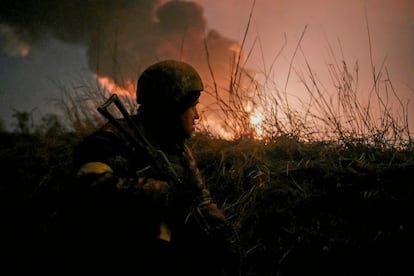
I am writing these lines from the area of intense turbulence that we entered on February 24, when Russia invaded Ukraine. A storm has engulfed Europe and we fear the worst, without knowing how the journey will end. The lives cut short by Russia’s war against Ukraine can already be counted by the thousands. The lives are on both sides of the conflict – childish-looking soldiers who cannot even remember their superiors’ names or explain why they have been sent to punish their neighbors; Ukrainians who are bravely defending their country from an enemy that vastly outguns them.
Besides the military and civilian deaths, many of the wounded will be permanently disabled. Added to this is the immense destruction of Ukraine’s historical heritage as well as its economic infrastructure. And that’s if Vladimir Putin, president and commander-in-chief of the armed forces of a country with an unhealthy sense of patriotism, doesn’t get it in his head to press the nuclear button, either out of pride, arrogance or fanatical conviction.
It is difficult to concentrate on writing when you know that your friends, some of whom are no longer young, are sitting in a bunker to protect themselves from the missiles that have already reached downtown Kharkiv, a creative and dynamic city that is home to some of the best architectural examples of European constructivism. It is difficult to write when your friends from Ukraine are already on the frontlines or insisting on participating in the civil defense despite all their ailments and their extra pounds.
It also hurts to think that other people who were once close to you in Russia are now conscious accomplices to this perversion, and you would like to ask them if they are joining in this madness out of personal conviction, to further their careers or because of threats from their superiors. If we make it out of this, it will take work to make Russian society and its leaders understand that being a patriot does not mean giving up on common sense or bending to the will of a despot who brings death and destruction and takes his own citizens to the brink of the abyss.
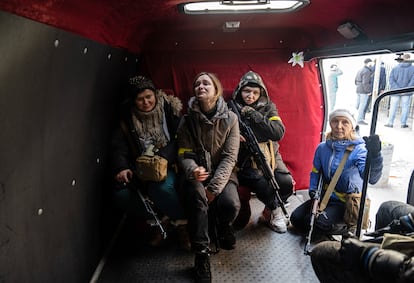
We’ve been living in a new historical period since February 24, one in which the fanaticism of the leader of one of the world’s two great nuclear powers has taken on a global role; one in which politics appears to be based on four questionable ideological assumptions: “We are always right, we always bring peace, we have never started a war and we have suffered more than anyone else from wars.” In the Soviet Union, nuclear weapons were part of a system of internal counterweights that acted as a guarantee against their irrational use.
When the Cold War ended, Russia and the West failed in their attempt to find a harmonious arrangement in the post-Soviet world, due to a series of errors and mix-ups. Now, the search for a stable security model depends on an outcome that in turn depends on Putin’s psychology – and if he were to decide to press the nuclear button, it would also depend on the role assigned to the more sophisticated sector of the Russian armed forces (which is aware of how the modern world works and what’s at stake) in terms of the specific (and secret) mechanism that will activate these weapons.
“We have to achieve a coup in Russia!” cries Slava in a village near Kharkiv where he has joined the resistance. “Tough sanctions against Russian oligarchs and Putin’s friends will make the latter put pressure on the military,” says this small business entrepreneur, expressing an unsubstantiated hope, as the Russian army is not given to uprisings. Nevertheless, when they are displeased by politicians’ actions, the military can have an influence on events through “passive resistance” as in 1991, when they did not join the coup (co-led by then-defense minister Dmitry Yazov) to save the USSR.
As we cross this turbulent zone, the Russia that dreamed of being a modern European country at the beginning of this century has now hoisted the flag of a pathetic crusade against “the empire of lies.” And existing evidence about the Russian leader’s state of mind throughout the years fits into this picture like the pieces of a sinister puzzle. In October 2018, at a seminar on the Black Sea coast, Putin boasted about his country’s military superiority, acquired thanks to “modern weapons” that were “high-tech” and had “high precision and ultrasound” features.
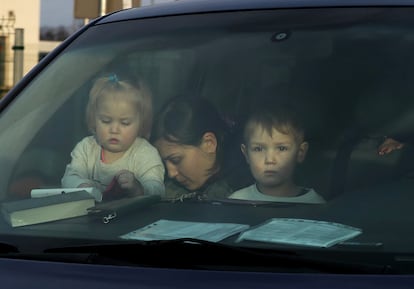
The Russian leader insisted that he would only use nuclear weapons preventively if faced with “an aggression against our territory,” but given his great rhetorical ability to portray his own attacks as acts of self-defense, his words did nothing to allay concerns. “The aggressor should know that revenge is inevitable and that they will be annihilated. And we, the victims of the aggression, will go to heaven as martyrs while they will simply perish because they will not even have time to repent,” said Putin on that occasion.
These days, nobody truly knows what is going on in the mind of this individual who is not used to having anyone contradict him. “Putin might be crazy, but he would not be president of this country without a society that supports him and which is responsible for his rise,” says Vadim, an educated Russian who left the USSR in 1991 and, speaking now as a citizen of a Western country, describes his homeland as “a deeply amoral and lawless country.”
Support for Putin in Russia is expressed on social media and in letters of solidarity with the president that are signed by thousands of people. These individuals have accepted the official line about a military mission sent to Ukraine to fight the “fascists” who are allegedly attacking children in the pro-Russian separatist republics in the Donbas region. “Russia does not start the war, Russia ends the war,” reads a letter signed by nearly 6,000 people, most of them from places outside the big cities, who describe themselves as leaders of non-profit groups urging the “healthy forces” of Ukraine to speak out against “the illegal and nationalist regime” that “restored fascism and stained our grandparents’ memory.” They hail Putin’s decision as “necessary and brave” and as a move aimed at preventing “a nuclear third world war” that could take place if, they say, Ukraine were to renounce the Budapest Memorandum on Security Assurances signed in 1994, under which the United States, Russia and the United Kingdom gave Kyiv assurances that they would not use military or economic force against it, in exchange for Ukraine giving up its nuclear weapons.
People in Moscow no longer feel safe. Users of a Facebook group in a centrally located neighborhood were recently taking an interest in finding the nearest air raid shelter, and many other residents are opting to leave the country for a while, although this practice has come under scrutiny by security agencies that are acting in an increasingly rude and brutal manner. Not everyone is keeping quiet, but the people who are protesting on the streets are few.
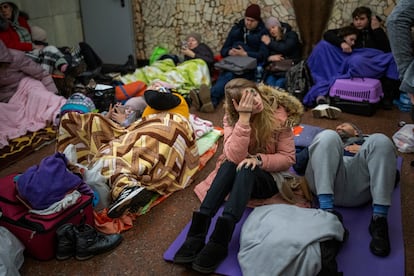
Meanwhile, military censorship prohibits the use of the word “war,” since Putin’s world is built by denying the existence of annoying words such as “annexation” (of Crimea) or “Navalny” (for Alexey Navalny, the opposition leader who was jailed and targeted in a poisoning attempt). One of the people who were recently arrested for protesting at Pushkin Square was Irina, a philologist whose deceased father was jailed as a dissident during Soviet times. “Your dad would be proud of you,” I recently wrote to this woman, whom I’ve known since she was a child.
The first cracks may be showing from within the regime. On the television channel Dozhd, Senator Lyudmila Narusova, widow of the late mayor of Leningrad (now Saint Petersburg) Anatoly Sobchak (who was Putin’s mentor), upbraided the Russian Defense Ministry for leaving its dead behind in the fields of Ukraine, sometimes burnt to the point of being unidentifiable.
Residents of Kyiv don’t feel safe either, but those who have chosen to stay are very clear about their mission. “There are no tears. There is no despair. There is no fear at all. What is it? Anger and rage. And the desire to do something. Yesterday I went to the dump to collect bottles [to make Molotov cocktails]. And I wasn’t even embarrassed,” writes Julia, a Ukrainian woman who hails from the pro-Russian region of Luhansk, and whose father calls her every day from the separatist zone to let her know that “soon you will be liberated by Putin’s troops.”
Writing to me from the city of Donetsk, a local government worker whom I’ll call Olga – and who often helped me deal with bureaucracy on my visits to the pro-Russian “popular republic,” where foreign journalists were always viewed suspiciously – complained about the photographs I posted to my Facebook account, where you see people fleeing the Russian invasion with their pets. “Yes, poor dogs. But don’t you feel any pity for our own peaceful citizens? I’m surprised at you,” she wrote. There was never any intention on my part to compare people with animals, but perhaps Olga fears that the pets will help humanize the people who are fleeing the Russian invasion, because the fact that they didn’t leave their animals behind could ruin their reputation as fascist assassins that the Russian narrative has built around Ukrainians.
Along the frontline in the Donbas and in nearby municipalities on both sides of it, there have been tragic incidents and blood has been spilled in shootouts and violations of the ceasefire signed in February 2015 as part of the Minsk agreement. But the mission of the Organization for Security and Co-operation in Europe (OSCE), which was monitoring the situation in the area, did not confirm the existence of a massive Ukrainian offensive against the so-called “republics,” that is to say, it did not corroborate the central theory used to justify the Russian invasion, according to which Kyiv had launched a huge offensive to quell the secessionist civilian populations there.
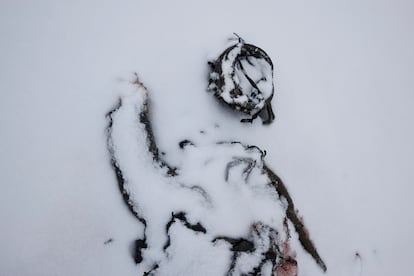
In the weeks leading up to the war, regular OSCE reports, carried out with limited means, had noticed an increase in hostilities, but these were viewed as part of the oscillating nature of the violence in the area throughout all these years. It is true that in all this time Kyiv has been unable to attract or seduce the secessionists, and it has not made life easy for those Ukrainian citizens (who for the most part are now Russians) who were subjected to a tough blockade that encouraged “the evolution of their identity” and their integration into Russia.
As I write these lines, the roads leading to Ukraine’s western edge are full of people who are spending days at a time waiting outside border checkpoints into Poland. Thanks to a ride on a humanitarian aid vehicle, in three hours I was able to pass by a line of cars stretching many kilometers, and whose license plates showed that they came from all parts of Ukraine. Traveling inside the car with us was Julia, an executive at a perfume firm, and her five-year-old son Mikhail. Julia’s husband stayed behind to fight the invader, the same one that forced them out of Crimea eight years ago. Julia could barely hold back tears as she thought back on the comfortable apartment they’d just left behind in Kyiv. She and her child were headed for the home of a distant relative in Poland, but after that, she did not know where they would go.

If their goal is to divide Ukraine into two sections separated by the Dnieper River, the Russians might not attack the western city of Lviv, with its cobblestoned streets, modernist buildings and Baroque temples that bear witness to its Polish and Austro-Hungarian past. In Market Square, the branch office of Alfa Bank is closed. The founder of this leading private bank, Mikhail Fridman (one of the wealthiest men in Russia) was born here. To my surprise, Alfa Bank credit cards were still working in early March, and I used mine to line the pantry of the folks who took me in, to pay for a coffee at the Hotel George, to recharge my Russian cellphone and to buy a flight between Krakow and Barcelona.
Mikhail Fridman, who has been personally affected by Western sanctions, has spoken out against the war. Perhaps he and others like him can add something more to neutralize the delirious Vladimir Putin.
Tu suscripción se está usando en otro dispositivo
¿Quieres añadir otro usuario a tu suscripción?
Si continúas leyendo en este dispositivo, no se podrá leer en el otro.
FlechaTu suscripción se está usando en otro dispositivo y solo puedes acceder a EL PAÍS desde un dispositivo a la vez.
Si quieres compartir tu cuenta, cambia tu suscripción a la modalidad Premium, así podrás añadir otro usuario. Cada uno accederá con su propia cuenta de email, lo que os permitirá personalizar vuestra experiencia en EL PAÍS.
¿Tienes una suscripción de empresa? Accede aquí para contratar más cuentas.
En el caso de no saber quién está usando tu cuenta, te recomendamos cambiar tu contraseña aquí.
Si decides continuar compartiendo tu cuenta, este mensaje se mostrará en tu dispositivo y en el de la otra persona que está usando tu cuenta de forma indefinida, afectando a tu experiencia de lectura. Puedes consultar aquí los términos y condiciones de la suscripción digital.









































